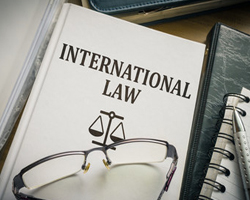International Law and Foreign Relations
International Law: An Overview
 International law consists of rules and principles governing the relations and dealings of nations with each other, including relations between states and individuals, and relations between international organizations. Generally, international law is characterized as either public international law or private international law. Public international law addresses questions of the rights between several nations or nations and the citizens or subjects of other nations. Private international law deals with controversies between private persons, arising out of situations having significant relationship to more than one nation. In recent years, the distinctions between public and private international law have became increasingly uncertain. Issues of private international law may also implicate issues of public international law, and many matters of private international law have substantial significance for the international community of nations.
International law consists of rules and principles governing the relations and dealings of nations with each other, including relations between states and individuals, and relations between international organizations. Generally, international law is characterized as either public international law or private international law. Public international law addresses questions of the rights between several nations or nations and the citizens or subjects of other nations. Private international law deals with controversies between private persons, arising out of situations having significant relationship to more than one nation. In recent years, the distinctions between public and private international law have became increasingly uncertain. Issues of private international law may also implicate issues of public international law, and many matters of private international law have substantial significance for the international community of nations.
DOMAINS OF INTERNATIONAL LAW
International Law includes the basic, classic concepts of law in national legal systems — status, property, contract, and tort (personal injury). It also includes substantive law, procedure, process and remedies.
SOURCES OF INTERNATIONAL LAW
Custom and convention are the primary sources of international law. Customs are those practices that countries generally and consistently have followed out of a sense of legal obligation. Most of those customs have been codified in the Vienna Convention on the Law of Treaties.
Conventional international law derives from international agreements/contracts and may take any form upon which the contracting parties agree. Agreements may be made in respect to any matter except to the extent that the agreement conflicts with the rules of international law incorporating basic standards of international conduct or the obligations of a member state under the Charter of the United Nations.
International agreements create law for the parties of the agreement. They may also lead to the creation of customary international law when they are intended for adherence generally and are in fact widely accepted. Customary law and law made by international agreement have equal authority as international law, though the parties may contractually assign higher priority to one of the sources. However, some rules of international law are recognized by international community as peremptory, meaning they are not subject to change or revision, other than through a subsequent peremptory rule of international law.
General principles common to systems of national law is a secondary source of international law. There are situations where neither conventional nor customary international law can be applicable. In this case a general principle may be invoked as a rule of international law because it is a general principle common to the major legal systems of the world and not inappropriate for international claims.
Foreign Relations
Foreign relations law of the United States encompasses both international law, and that part of the domestic law of the United States that involves matters of significant concern to the foreign relations of the United States.
The domestic portion of foreign relations law is extensively federal law: The President has the power under the Constitution, subject to the approval of the Senateto nominate and appoint ambassadors and other public ministers and consuls. These representatives may then act with binding authority.
Consuls are the main diplomatic relations vehicle for the United States. A consul is an officer commissioned by a government to represent it in a foreign country with the goal of protecting and promoting the interests of its citizens.
Connect with Top-rated Attorneys Near You
Sponsored Advertisement
Other Other Practice Areas Topics
Laws Protecting Civil Liberties, Civil Rights, and Human Rights
Consumer Rights Law
Agricultural Law
Constitutional Law
Aviation Law
Education Law
Entertainment and Sports Law
Gaming Law
Government Agencies And Programs
Communications and Media Law
The Laws Governing Military Service Personnel in the United States
Latest Article
What Is a Trust Fund? A Comprehensive Guide
A trust fund is a powerful tool that has stood the test of time. It is an essential instrument in modern wealth manageme... Read More
Arraignment: Meaning, Common Charges, & Process
Arraignment is a pivotal moment within the criminal justice system, marking the formal initiation of criminal proceeding... Read More
What Is Probable Cause? Definition and Examples
The Constitution protects you from being searched without a valid reason. But what exactly constitutes a valid reason? A... Read More
GETLEGAL®ATTORNEY DIRECTORY
Find Leading Attorneys in Your Area
NEED PROFESSIONAL HELP?
Talk to an Attorney
How It Works
- Briefly tell us about your case
- Provide your contact information
- Choose attorneys to contact you





